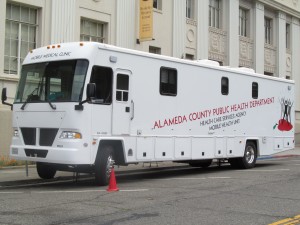Reggie Evans came to the van to get treated for his allergies. As a street vendor who sells homemade jewelry on the streets in downtown Berkeley, Reggie said he often encounters passersby who ignore and discriminate against him for being homeless. But on the van, it's different. “They’re not snotty. They don't judge you,” Reggie told me.
But despite the mobile team's success in treating the homeless over the years, there has been a growth of patients with untreated mental health conditions and drug and alcohol addiction.
Not altogether surprisingly, Brown says these patients often fail to follow through with their medical referrals and go on with their lives -- untreated.
“Those are the hardest clients to work with and the hardest clients to get a positive outcome with because of their struggles with mental health and substance abuse,” Brown said.
Gerald Walker, a mental health specialist from Alameda County Behavioral Health Services Agency, counsels mentally ill patients and helps them seek proper treatment. Walker began working for the van on a part-time basis in 1991 to help patients with mental illnesses. While he cannot treat them, he can refer them to the appropriate care.
“Part of our job is to teach them to become better patients,” Walker said.
He described the van’s mentally ill patients as “treatment resistant individuals,” because it is up to them to decide if they want to get treated for their conditions.
“They haven’t come to a point where they want to admit that they have a mental illness,” said Walker. “It’s almost impossible to treat someone who is telling you that the problem does not exist.
Even with the current challenges, Walker remains optimistic and points to Alameda County and the state of California’s current push to combine behavioral health care and primary care in treating patients.
“We are a few steps ahead of many others because we ... realized that this has been a problem for a really long time. We’ve been putting systems together that can address that,” Walker explained.
Still, the systems do not support all patients equally.
“In Alameda County right now, we have a pretty strong system of care for people that have a serious mental illness," said David Modersbach, Director of ACHCHP. "That could be something like schizophrenia or very severe depression or other sometimes organic mental illnesses. However, persons that have a low acuity mental illness such as depression, anxiety, personality disorders -- these mental illnesses don’t qualify them for low cost care."
Modersbach calls these patients the “walking wounded” because they don’t have access to support services and care that other community members “take for granted.”
To address these patients, Modersbach said his team is working with Alameda County Behavioral Health Care Services to explore expanding the current mental health services being offered.
Part of this potential expansion includes adding psychiatrists and licensed clinical social workers to the Health Services Vans so they can directly treat mentally ill patients.
“What we would like to do is have a system where we’re able to provide some sort of treatment for people at the places where homeless people are,” Modersbach explained.
While ACHCHP and Behavioral Health Care Services are still in the planning stage of the expansion, Modersbach said he remains optimistic and hopes to see the expansion happen in early 2013.
